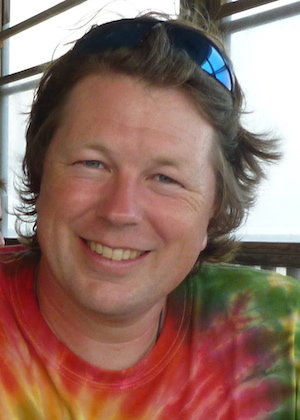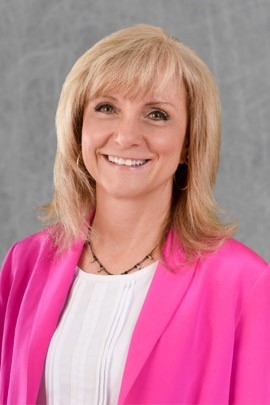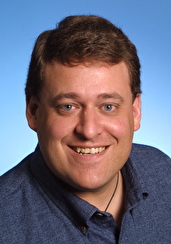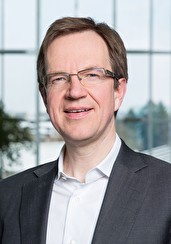Keynotes
Steve Easterbrook - Research Track Keynote

Verifying the Forecast: How climate models are developed and tested
[slides]Abstract
Climate models are large and complex software ecosystems, developed through collaboration across many different scientific disciplines. In this talk, I will explore how this software ecosystem works, drawing on my field studies at climate modelling labs in Europe and North America. I’ll begin with a brief overview of what a climate model is, and how it is used. I’ll then dive deeper into the software challenges of developing a climate model, including the challenge of coupling disparate model components, dealing with model versioning and model management issues, and the role that climate models play in enabling collaborative work. With this as background, we’ll be able to answer the verification and validation question: how do climate scientists know they can trust their code, and how does this relate to the broader question of why we can trust the science that this software supports. I’ll end the talk with a brief overview of what the models tell us about the prospects for meeting the UN’s target of keeping global warming below the threshold of 2°C.
Biography
Steve Easterbrook is a professor of Computer Science at the University of Toronto, and a member of the School of Environment and the Centre for Global Change Science. He received his Ph.D. (1991) in Computing from Imperial College in London (UK), and joined the faculty at the School of Cognitive and Computing Science, University of Sussex. From 1995-99, he was lead scientist at NASA´s Independent Verification and Validation (IV&V) Facility in West Virginia, where he investigated software verification on the Space Shuttle Flight Software, the International Space Station, and the Earth Observation System. He moved to the University of Toronto in 1999. His research interests range from modelling and analysis of complex adaptive systems to the socio-cognitive aspects of team interaction. His current research is in climate informatics, where he studies how climate scientists develop computational models to improve their understanding of earth systems and climate change, and the broader question of how that knowledge is shared with other communities. He has been a visiting scientist at the UK Met Office Hadley Centre, in Exeter, the National Centre for Atmospheric Research in Boulder, Colorado; the Max-Planck Institute for Meteorology, in Hamburg, and the Institute Pierre Simon Laplace in Paris.
Laurie Williams - Research Track Keynote

The Rising Tide Lifts All Boats: The Advancement of Science in Cyber Security
[slides]Abstract
Stolen passwords, compromised medical records, taking the internet out through video cameras– cybersecurity breaches are in the news every day. Despite all this, the practice of cybersecurity today is generally reactive rather than proactive. That is, rather than improving their defenses in advance, organizations react to attacks once they have occurred by patching the individual vulnerabilities that led to those attacks. Researchers engineer solutions to the latest form of attack. What we need, instead, are scientifically founded design principles for building in security mechanisms from the beginning, giving protection against broad classes of attacks. Through scientific measurement, we can improve our ability to make decisions that are evidence-based, proactive, and long-sighted. Recognizing these needs, the US National Security Agency (NSA) devised a new framework for collaborative research, the “Lablet” structure, with the intent to more aggressively advance the science of cybersecurity. A key motivation was to catalyze a shift in relevant areas towards a more organized and cohesive scientific community. The NSA named Carnegie Mellon University, North Carolina State University, and the University of Illinois – Urbana Champaign its initial Lablets in 2011, and added the University of Maryland in 2014.
This talk will reflect on the structure of the collaborative research efforts of the Lablets, lessons learned in the transition to more scientific concepts to cybersecurity, research results in solving five hard security problems, and methods that are being used for the measurement of scientific progress of the Lablet research.
Biography
Laurie Williams is the Interim Department Head of Computer Science and a Professor in the Computer Science Department of the College of Engineering at North Carolina State University (NCSU). Laurie is a co-director of the NCSU Science of Security Lablet sponsored by the National Security Agency. Laurie's research focuses on software security; agile software development practices and processes; software reliability, and software testing and analysis.
Roy T. Fielding and Richard N. Taylor - SIGSOFT Impact Award Talk


Reflections on the REST Architectural Style and "Principled Design of the Modern Web Architecture”
[slides]Abstract
Seventeen years after its initial publication at ICSE 2000, the Representational State Transfer (REST) architectural style continues to hold significance as both a guide for understanding how the World Wide Web is designed to work and an example of how principled design, through the application of architectural styles, can impact the development and understanding of large-scale software architecture. However, REST has also become an industry buzzword: frequently abused to suit a particular argument, confused with the general notion of using HTTP, and denigrated for not being more like a programming methodology or implementation framework.
In this talk and accompanying paper, we chart the history, evolution, and shortcomings of REST,
as well as some related architectural styles that it inspired, from the
perspective of a chain of doctoral dissertations produced by the
University of California's Institute for Software Research at UC Irvine.
These successive theses share a common theme: extending the
insights of REST to new domains and, in their own way, charting the
outer boundary of software engineering as it applies to software architecture
and architectural design.
We conclude with a topic rarely discussed these days: the circumstances,
environment, and organizational characteristics that gave rise to this body of work.
Biography
Roy T. Fielding, Senior Principal Scientist at Adobe, is known for his pioneering work on the World Wide Web, open source, and software architecture. He wrote the standards for HTTP/1.x and URI, contributed to many Web technologies, and defined the REST architectural style as a model for the design principles behind the modern Web architecture. Dr. Fielding is a founder of the Apache HTTP Server Project, incorporator and first chairman of the Apache Software Foundation, and former member of the ASF board of directors. He has been honored with the 1999 ACM Software System Award, the OSCON 2000 Appaloosa Award for Vision, and the 2010 ICSE Most Influential Paper. Dr. Fielding was among the first elected members of the W3C Technical Architecture Group and the first TR100 selected by MIT Technology Review.
Richard N. Taylor was named an ACM Fellow in 1998 for contributions to research in software engineering and software environments. In 2009 he was recognized with the ACM SIGSOFT Outstanding Research Award, after receiving the ACM SIGSOFT Distinguished Service Award in 2005. He was named Chancellor's Professor of Information and Computer Sciences at the University of California, Irvine in 2010, where he served as Director of UC Irvine’s Institute for Software Research for 18 years. In recent years his research interests have been centered on design and software architectures, especially focusing on decentralized systems. In 2008 he received the ICSE Most Influential Paper award, and in 2017 was named a Distinguished Engineering Alumnus from the University of Colorado, Boulder.
Wolfgang Emmerich - Industrial Track Keynote

Software engineering research results in industrial practice - a tale of two projects
Abstract:
In this talk, I will discuss the use of software engineering research results in industrial practice, based on two projects I have been involved with. The first project addressed the challenge that manipulation of financial market data had to be expressed precisely for a large number of different financial markets. The challenge was addressed by defining a functional Domain Specific Language (DSL) that was geared towards expressing these manipulations at a high level of abstraction. An environment that implements the DSL was built using the Eclipse platform together with a compiler that generates a Java-based reference implementation of these manipulations. The implementation is used as a test oracle to generate test cases, which are in turn used to validate a soft real-time system that implements these manipulations. In another project that is still ongoing, I have proposed the use of software product line research to engineer a family of mobile banking applications. I will reflect on the experience of integrating software product line principles and modern Agile development practices. I will then discuss a few areas of software engineering research, that I have personally been involved in, that I have found not to be very useful in practice. I will conclude by outlining some topics where novel research results would be very beneficial from an industrial point of view.
Biography
Wolfgang graduated in 1990 with a Diploma in Informatics from University of Dortmund and in 1995 with a Doctor of Science from the University of Paderborn. Following a brief period of post-doctoral research at the Software Verification Research Centre at the University of Queensland in Brisbane, Australia, he pursued an academic career in London. In 1996, he was appointed as a Lecturer in the School of Informatics at City University and continued his academic career from 1997 in the Department of Computer Science at UCL, where he currently holds a part-time position as Professor of Distributed Computing. Wolfgang has served on the Editorial Board of IEEE Transactions on Software Engineering and was Programme Co-chair of the Int. Conference on Software Engineering in 2007. In 2000, Wolfgang co-founded the Zuhlke Technology Group, which now employs just under 1,000 members of staff in 12 offices in Switzerland, Germany, Austria, UK, Serbia and Singapore. At Zuhlke, Wolfgang is responsible for Zuhlke’s UK and Asian operations as well as the Group's software engineering strategy. Wolfgang is a Member of the ACM, ACM SigSoft, IEEE Computer Society, the IET and the Institute of Directors in the UK